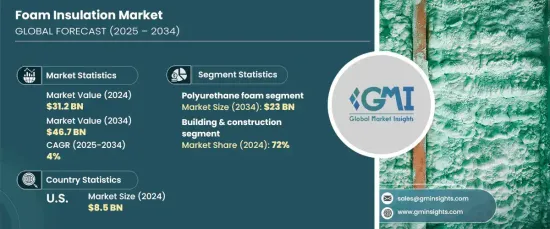PUBLISHER: Global Market Insights Inc. | PRODUCT CODE: 1667024

PUBLISHER: Global Market Insights Inc. | PRODUCT CODE: 1667024
Foam Insulation Market Opportunity, Growth Drivers, Industry Trend Analysis, and Forecast 2025 - 2034
The Global Foam Insulation Market was valued at USD 31.2 billion in 2024 and is expected to grow at a CAGR of 4% from 2025 to 2034. This growth is primarily driven by the increasing demand for energy-efficient buildings, stringent energy conservation regulations, and the rising shift toward sustainable construction practices. Foam insulation materials, including polyurethane, polystyrene, and polyisocyanurate, are highly regarded for their superior thermal resistance and moisture control properties. These qualities make foam insulation an essential component across a variety of residential, commercial, and industrial applications. As awareness about environmental impact and energy efficiency grows, foam insulation plays a crucial role in reducing energy consumption, offering long-term savings, and contributing to the creation of eco-friendly, energy-efficient buildings.

The foam insulation market is comprised of several key material types, including polyurethane foam, polyolefin foam, phenolic foam, polystyrene foam, elastomeric foam, and others. Among these, polyurethane foam dominates the market, contributing significantly to the revenue in 2024. Its growth is expected to continue through 2034, driven by its exceptional thermal efficiency, moisture resistance, and ease of application. Polyurethane foam is highly sought after due to its ability to form a continuous, seamless layer that adheres effortlessly to surfaces, reducing air leaks and boosting energy performance. In addition, the foam's expansion properties make it ideal for filling irregular spaces, ensuring optimal coverage and energy efficiency.
| Market Scope | |
|---|---|
| Start Year | 2024 |
| Forecast Year | 2025-2034 |
| Start Value | $31.2 Billion |
| Forecast Value | $46.7 Billion |
| CAGR | 4% |
In terms of end use, the foam insulation market is divided into several key segments, including building and construction, automotive and transportation, electronics, packaging, and others. The building and construction sector holds the largest market share due to the essential role of foam insulation in regulating indoor temperatures and improving energy efficiency. In this sector, foam insulation helps minimize heating and cooling costs while complying with modern building codes that prioritize sustainability and energy savings. As the demand for eco-friendly designs and energy-efficient solutions increases in the construction industry, foam insulation continues to be a valuable tool, offering versatility and seamless integration into walls, floors, and roofs for superior thermal protection.
The U.S. foam insulation market reached a valuation of USD 8.5 billion in 2024 and is expected to experience steady growth in the coming years. This growth is largely driven by rising energy efficiency standards and the implementation of strict building regulations across North America. Regulatory bodies are actively promoting energy-saving practices and sustainable construction, pushing for the adoption of advanced insulation technologies that reduce energy consumption and carbon footprints. Furthermore, programs that encourage green certifications and eco-friendly building designs have further boosted the adoption of foam insulation in residential, commercial, and industrial applications.
Table of Contents
Chapter 1 Methodology & Scope
- 1.1 Market scope & definition
- 1.2 Base estimates & calculations
- 1.3 Forecast calculation
- 1.4 Data sources
- 1.4.1 Primary
- 1.4.2 Secondary
- 1.4.2.1 Paid sources
- 1.4.2.2 Public sources
Chapter 2 Executive Summary
- 2.1 Industry synopsis, 2021-2034
Chapter 3 Industry Insights
- 3.1 Industry ecosystem analysis
- 3.1.1 Factor affecting the value chain
- 3.1.2 Profit margin analysis
- 3.1.3 Disruptions
- 3.1.4 Future outlook
- 3.1.5 Manufacturers
- 3.1.6 Distributors
- 3.2 Supplier landscape
- 3.3 Profit margin analysis
- 3.4 Key news & initiatives
- 3.5 Regulatory landscape
- 3.6 Impact forces
- 3.6.1 Growth drivers
- 3.6.1.1 Increasing emphasis on energy efficiency
- 3.6.1.2 Stringent building codes and regulations
- 3.6.1.3 Versatility and innovation in product development
- 3.6.2 Industry pitfalls & challenges
- 3.6.2.1 Environmental concerns and sustainability challenges
- 3.6.1 Growth drivers
- 3.7 Growth potential analysis
- 3.8 Porter’s analysis
- 3.9 PESTEL analysis
Chapter 4 Competitive Landscape, 2024
- 4.1 Introduction
- 4.2 Company market share analysis
- 4.3 Competitive positioning matrix
- 4.4 Strategic outlook matrix
Chapter 5 Market Size and Forecast, By Product, 2021-2034 (USD Billion) (Kilo Tons)
- 5.1 Key trends
- 5.2 Polyurethane foam
- 5.3 Polystyrene foam
- 5.4 Polyolefin foam
- 5.5 Phenolic foam
- 5.6 Elastomeric foam
- 5.7 Others
Chapter 6 Market Size and Forecast, By End Use, 2021-2034 (USD Billion) (Kilo Tons)
- 6.1 Key trends
- 6.2 Building & construction
- 6.3 Automotive & transportation
- 6.4 Electricals & electronics
- 6.5 Packaging
- 6.6 Others
Chapter 7 Market Size and Forecast, By Form, 2021-2034 (USD Billion) (Kilo Tons)
- 7.1 Key trends
- 7.2 Spray
- 7.3 Flexible
- 7.4 Rigid
Chapter 8 Market Size and Forecast, By Region, 2021-2034 (USD Billion) (Kilo Tons)
- 8.1 Key trends
- 8.2 North America
- 8.2.1 U.S.
- 8.2.2 Canada
- 8.3 Europe
- 8.3.1 UK
- 8.3.2 Germany
- 8.3.3 France
- 8.3.4 Italy
- 8.3.5 Spain
- 8.3.6 Russia
- 8.4 Asia Pacific
- 8.4.1 China
- 8.4.2 India
- 8.4.3 Japan
- 8.4.4 South Korea
- 8.4.5 Australia
- 8.5 Latin America
- 8.5.1 Brazil
- 8.5.2 Mexico
- 8.6 MEA
- 8.6.1 South Africa
- 8.6.2 Saudi Arabia
- 8.6.3 UAE
Chapter 9 Company Profiles
- 9.1 Air Barrier Association of America
- 9.2 Armacell International
- 9.3 BASF
- 9.4 Carlisle Companies
- 9.5 Covestro
- 9.6 Dow Chemical
- 9.7 Huntsman Building Materials
- 9.8 Huntsman Corporation
- 9.9 Johns Manville
- 9.10 Kingspan Group
- 9.11 Knauf Insulation
- 9.12 Owens Corning
- 9.13 Polyfoam Corporation
- 9.14 Rockwool International
- 9.15 Saint-Gobain
- 9.16 Spray Foam Insulation Association




